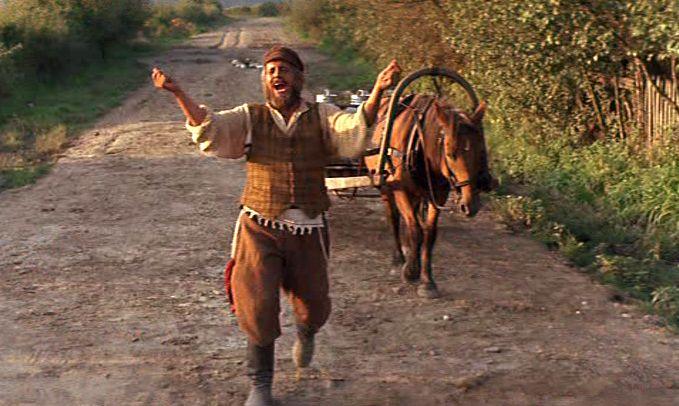
The more particular you make your story, the more universal it becomes, or so they say. And Norman Jewison’s adaptation of Fiddler on the Roof (1971), one of the longest-running musicals in Broadway history, is certainly a case in point.
On the surface, it is a story about a poor Jewish milkman living in Tsarist Russia in the early 1900s. The film makes frequent references to Jewish culture and ritual, and one of its subplots even links this milkman and his family to the political protests that took place at the time, only a dozen years or so before the Bolshevik Revolution. But the core theme of the film—tradition, and the ways in which people hold on to it, resist it, and sometimes do both at the same time—has helped it to win audiences over around the world.
Tevye (Topol), the milkman in question, explains at the beginning of the film that tradition is what has helped the Jewish people to survive for so many years in so many parts of the world, despite sometimes intense opposition. Tradition, he says, tells the Jewish people who they are and what God expects of them. But Tevye has five daughters, three of whom are of marriageable age, and the choices his daughters make as they step into adulthood force Tevye to examine the role that tradition has played in his life.
First, there is Tzeitel (Rosalind Harris), the eldest, who shocks her father by choosing her own husband rather than accepting the man who has been picked for her by the local matchmaker. (Tzeitel’s preferred husband, incidentally, is a tailor who eventually buys a sewing machine and declares excitedly that no one in the village will have to wear hand-stitched clothes anymore; his neighbors may object to some forms of modernization, but they do not object to this.) Second, there is Hodel (Michele Marsh), who falls in love with a young Marxist. And third, there is Chava (Neva Small), who falls in love with a local Christian and thus risks being disowned by her family altogether.
Tevye’s efforts to deal with these situations lead to much humor, a fair bit of drama, and one fantastic song after another, from the comic fantasy of ‘If I Were a Rich Man’ and the boisterous celebration of ‘To Life’ to the liturgical formality of ‘Sabbath Prayer’ and the thoughtful reflections prompted by a wedding ceremony in ‘Sunrise, Sunset’. And as Tevye and his wife (who were paired off by a matchmaker many years ago, before they had even met) ponder the romantic attraction that has besotted their daughters, they realize that an even deeper love has grown between them, as well (‘Do You Love Me?’).
Like most musicals, Fiddler on the Roof retains an element of theatricality, most notably in the way Tevye frequently addresses the audience. But unlike a lot of earlier musicals—and with one notable exception, namely a comically nightmarish dream sequence—director Norman Jewison gives this film a more naturalistic feel by shooting much of it on location in Eastern Europe, specifically in what was then known as Yugoslavia. (Jewison would go on to embrace a more openly artificial aesthetic in his next musical, the 1973 adaptation of Jesus Christ Superstar.)
Fiddler on the Roof premiered on Broadway in 1964, the film came out in 1971, and a lot had happened in American culture between those two points. So it would not be too hard to imagine that the film is, on some level, addressing—and trying to ease—the tension of its times between the old-fashioned way of doing things and the newer, more radical ways advocated by some. But the film, and the musical on which it is based, transcend that subtext; by staying rooted in the experiences of Tevye and his neighbors, Fiddler on the Roof remains a story for everyone and has, indeed, become a tradition unto itself.
—Peter T. Chattaway (2011/2022)
- Directed by: Norman Jewison
- Produced by: Norman Jewison Patrick Palmer
- Written by: Sholom Aleichem Arnold Perl Joseph Stein
- Music by: Jerry Bock
- Cinematography by: Oswald Morris
- Editing by: Anthony Gibbs Robert Lawrence
- Release Date: 1971
- Running Time: 181
- Language: English, Hebrew, Russian
Arts & Faith Lists:
2006 Top 100 — #86
2011 Top 100 — #96
2014 Top 25 Divine Comedies — #18
2020 Top 100 — #81